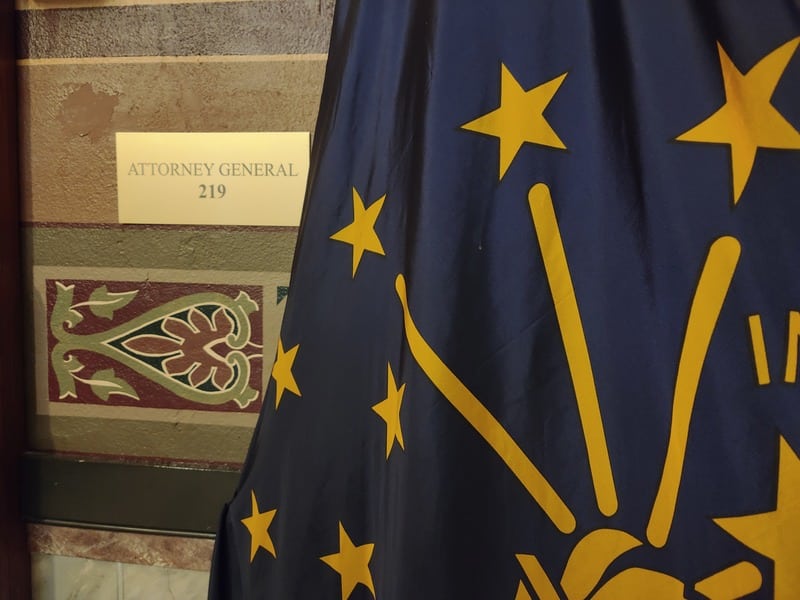
Marilyn Odendahl
The Indiana Citizen
May 2, 2024
The Court of Appeals of Indiana has upheld an amendment to state law which allows Indiana Attorney General Todd Rokita to keep secret a report about his previous moonlighting gig, even though that amendment was written by the attorney general’s office and slipped into the statute while the litigation over access to the report was ongoing.
In Rokita v. Tully 23A-PL-705, the unanimous appellate panel reversed the Marion County Superior Court which ruled in January 2023 that Rokita had to turn over the informal advisory opinion from the Office of the Inspector General, although he was permitted to redact as much as he wanted. Instead Rokita appealed and late in the 2023 legislative session, lawmakers inserted new language into the Indiana code, making the inspector general’s informal advisory opinions confidential and including a retroactive clause so that the new amendment covered the already-issued opinions including the one about Rokita’s moonlighting.
Citing to 2017 precedent, Judge Dana Kenworthy wrote for the Court of Appeals, “As our (Indiana) Supreme Court has reminded: ‘The legislature’s policy choices, so long as they are constitutional, are beyond our purview. We neither applaud the wisdom of such choices nor condemn their folly. We simply assess their legality.’”
The appellate court found the amendment did not violate either Article 3, Section 1, the separation of powers provision, or Article 4, Section 19, the single subject requirement, of the Indiana Constitution.
Rokita, who had argued state employees would not seek ethical guidance for their actions if the inspector general’s informal advisory opinions were public record, hailed the court’s decision.
“This is a win for good government,” Rokita said. “Letting the trial court opinion stand would have let office holders and public employees believe that they could lose their long-promised ability to privately ask for ethics guidance. We want them to ask for guidance before they act, which is why the process is confidential. Erasing that confidentiality only leads to bad government.”
Rokita left his former employer, Apex Benefits, in March 2021, amid a media firestorm that had broken out over the inspector general’s report. Indianapolis resident Barbara Tully filed the lawsuit in July 2021, after Rokita denied her request to see the OIG’s report.
A statement from Tully’s attorney, Bill Groth of Bowman & Vlink, said Tully respected the “well-researched and thoughtful appellate court opinion” and has not yet decided if she will appeal to the Indiana Supreme Court.
“But for Rokita’s ability to engineer a last-minute amendment to the budget bill that retroactively changed the law on which she and the trial court had relied, the trial court’s judgment, ordering Rokita to produce for the public’s inspection the report of the Inspector General, would have been affirmed,” Groth said of his client Tully in his statement. “When she filed her suit under (the Access to Public Records Act), she could not have possibly foreseen that Rokita, after losing in the trial court, would seek the Legislature’s aid in changing the statute retroactively in order to extinguish the trial court’s judgment in her favor.”
Final judgment had not been entered
Before the Court of Appeals, Rokita was represented by conservative attorney James Bopp of the Bopp Law Office in Terre Haute. Bopp argued the amendment resolved the Tully case in the attorney general’s favor, because the inspector general’s informal opinions were now confidential, including those issued prior to the state law’s amendment taking effect.
Tully, in her counter response, swiped back that the General Assembly violated the separation-of-powers clause by changing the law after the court had issued its “final judgment.”
However, the Court of Appeals found a final judgment had not been entered in the case. The panel agreed that the legislature cannot usurp a court’s final ruling but, here, the dispute over the inspector general’s report was continuing and the parties had not reached the end of the appeals process.
“If we were to accept Tully’s position that the legislature divested her of a final judgment, we would be creating a rule which prohibits the legislature from ever applying laws retroactively to pending appeals in which a trial-court order has been entered,” Kenworthy wrote. “This rule would conflict with the federal rule … and might result in our state’s judiciary infringing upon the legislature’s province to write and revise the law.”
In his statement on behalf of Tully, Groth highlighted concerns about what he and his client see as the General Assembly’s growing resistance to transparency. He noted, in particular, an amendment attached to House Enrolled Act 1338 during the 2024 legislative session, which prohibits the Indiana Public Access Counselor from drawing upon anything other than Indiana’s public access laws and state court opinions when issuing an advisory opinion.
“Ms. Tully remains concerned about the extreme deference Indiana’s appellate courts have recently been willing to give to a Legislature that, due to extreme partisan gerrymandering, is far from being representative of all Hoosiers,” Groth said. “And it is the same Legislature that has consistently opposed the creation of an independent redistricting commission as well as efforts to make it fully subject to Indiana’s public transparency laws, and that just this year raised serious questions about its commitment to the public’s right to know when it enacted legislation that significantly curbs the powers of Indiana’s Public Access Counselor to interpret Indiana’s public transparency laws when citizen complaints are filed.”
Dwight Adams, a freelance editor and writer based in Indianapolis, edited this article. He is a former content editor, copy editor and digital producer at The Indianapolis Star and IndyStar.com, and worked as a planner for other newspapers, including the Louisville Courier Journal.
The Indiana Citizen is a nonpartisan, nonprofit platform dedicated to increasing the number of informed and engaged Hoosier citizens. We are operated by the Indiana Citizen Education Foundation, Inc., a 501(c)(3) public charity. For questions about the story, contact Marilyn Odendahl at marilyn.odendahl@indianacitizen.org